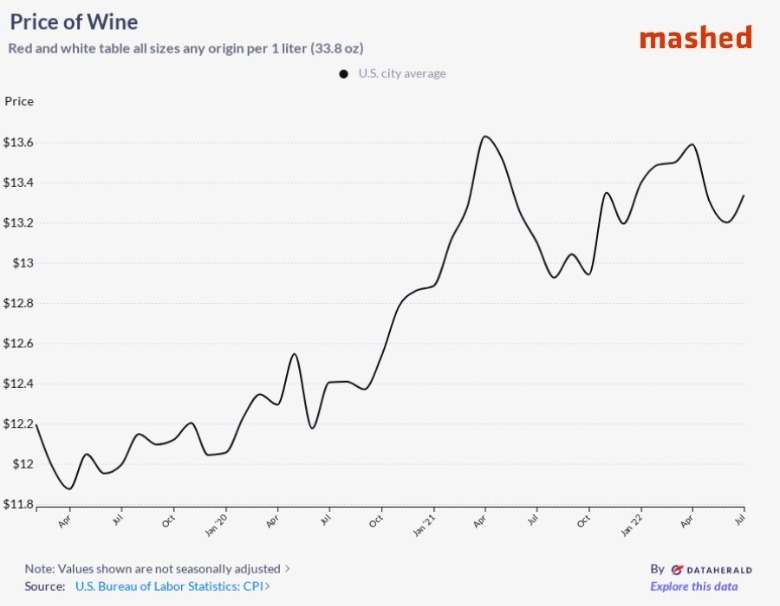Why Wine Is Actually Cheaper After Inflation
From gas to eggs to coffee to ground beef, it can seem like no consumer good is safe from the inflation that's been ripping through our wallets this past year-and-change. By this point, those who have been following along with global price trends can list the probable causes like school children reciting the Pledge of Allegiance. There are supply chain issues still catching up from pandemic labor shortages; there's increased demand, which was a major reason for the massive baby formula crisis; there are global farming resources withheld from Russia due to the war in Ukraine; and there are the standard increases in production costs.
Many Americans are counting on the Inflation Reduction Act, which President Biden signed into law on August 17, to help curb prices in the coming months. In addition to investing nearly $4 billion in low-emission energy sources, the act aims to address inflation in part by "cracking down on large, profitable corporations that currently get away with paying no federal income tax" (per The White House).
There's one industry that hasn't seen as much change as others since inflation took hold, however: the wine industry. Here's why the price of vino hasn't been as exorbitantly expensive as other products.
The price of wine is lower than it was a few months ago
With the exception of a surge in 2021, the price of wine has been relatively mellow during inflation — at least in comparison to other consumer goods. According to data compiled by the U.S. Bureau of Labor Statistics, the average cost of a liter of red and white table wine in July 2022 ($13.33) was 2.1% lower than its high point in April 2021 ($13.62). Granted, the current price of wine is significantly higher than it was in mid-2019, but that can be chalked up to standard U.S. inflation rates, which jump an average of 3.8% per year (per WorldData).
Earlier in 2022, wine did seem like the latest victim of inflation. It wasn't the liquid inside that was to blame, but rather, the glass bottles it came in. According to MarketWatch, the surge in oil prices had a major effect on the "energy-intensive process" of glass production.
So, why did the price of wine dip in the early summer months? One could look to the trend of zero-proof drinking, which The Wall Street Journal deems the "sober-curious movement." If demand is down, winemakers will be more likely to lower prices than raise them. Another reason could be the availability of canned wine and boxed wine — the latter of which may have finally overcome its negative stigma — whose materials are cheaper and more abundant. Whatever the case, here's hoping the price of wine sticks to its current path.

